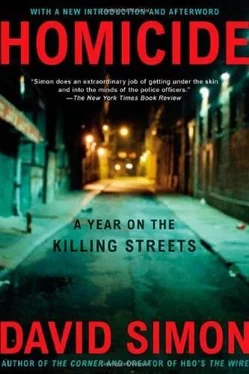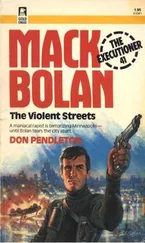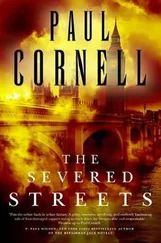“It takes two…”
Ask Rick Requer or Gary Dunnigan about that domestic from the Northeast, the one where the dead man has a hole in his throat so deep you can see the whole thorax, and his girlfriend claims that he routinely asked her to come at him with kitchen knives, the better to show off his martial arts skill. Or ask Worden and James about the loser who tries to break into an East Baltimore rowhouse only to have his own pistol used against him by the surprised but otherwise athletic male occupant. A single shot is fired during the struggle and the dying man sits down suddenly on the living room sofa.
“Get out of here before I blow your head off,” the homeowner shouts, clutching the gun.
“You already did,” says his assailant, losing consciousness.
“… to make a thing go right…”
Summer needs no motive; it’s a reason unto itself. Just ask Eddie Brown about the fifteen-year-old who shoots his friend with a defective.22 on Preakness Saturday night in Cherry Hill, then smugly refuses any statement to police, assured in his mind and in fact that he will only be charged as a juvenile. Then ask Donald Kincaid about Joseph Adams, who bled to death on the way to University Hospital after picking a fight with a fourteen-year-old and getting pushed through a convenience store window, the broken sheet glass falling on his neck like a guillotine.
“It takes two…”
Bodies everywhere as June bleeds into July, and even among men for whom a studied indifference to human weakness and misery is a necessary survival skill, summer produces its own special strain of the disease. This is CID homicide, mister, and neither heat nor rain nor gloom of night will stay these men from their rendezvous with callousness. Cruel jokes? The cruelest. Sick humor? The sickest. And, you ask, how can they possibly do it? Volume. That’s right, volume. They won’t be outsold, they won’t be undersold; they will solve no crime before its time.
Picture Garvey and Worden sharing a smoke outside a second-floor apartment on Lanvale, where an aging alcoholic lies dead on the floor, his bottle empty, his neck cleanly broken. Chances are he was alive when he fell to the floor drunk, but was then killed accidentally by his equally intoxicated wife, who forced the door against his neck as she tried to enter the room.
“You want to make it a murder?” deadpans Worden, inspecting and then lighting his cigar.
“We could use the stat,” jokes Garvey, equally dry.
“Then make it a murder. What do I know? I’m just an ignorant white boy from Hampden.”
“It’s a dunker…”
“I don’t think she’s strong enough to kill him.”
“What the hell,” says Garvey, as if sizing up a trout. “We’ll throw this one back.”
Or Jay Landsman doing another stand-up routine in lower Wyman Park, where the elderly occupant of a senior citizens’ high-rise has done a header from a twentieth-floor balcony. From the look of things, the old woman stayed pretty much intact until she glanced off a second-floor landing, her head and torso staying upstairs, legs and rump falling to street level.
“She went her separate ways,” Landsman tells the uniform at the scene. “So you’d better write separate incident reports.”
“Sir?”
“Never mind.”
“One guy on the sixth floor said he actually looked out his window and saw her falling,” the patrolman says, reading from his notes.
“Oh yeah?” says Landsman. “Did she say anything?”
“Uh, no. I mean maybe. I mean I didn’t ask.”
“Right,” says Landsman, “but have you found the pogo stick yet?”
“Pogo stick?” asks the flustered uniform.
“Pogo stick,” says Landsman firmly. “I think it’s pretty obvious this woman took a bad bounce.”
Blame it on the heat, because what else can explain that rollercoaster midnight shift in August, when Harry Edgerton takes an unattended death call from a young Southwest uniform, listens for a minute or two, then tells the kid he doesn’t have time to visit the scene.
“Listen, we’re kinda busy right now,” he says, cradling the phone on his shoulder. “Why don’t you throw the body in the back of your car and bring him on downtown so we can take a look at him?”
“Right,” says the kid, hanging up.
“Oh shit,” says Edgerton, fumbling through a directory for the Southwest dispatch phone number. “He actually believed me.”
A hellacious night it was, too, with a murder, two cuttings and a police-involved shooting. But two nights later, McLarney’s detectives are again tempting fate. Waiting for the first call of the night, Worden, James, and Dave Brown gather around the coffee room desk, concentrating their psychic powers on the phone extensions, trying to will into existence something more than a ghetto homicide, something that will bring unlimited overtime.
“I feel it.”
“Shut up. Concentrate.”
“I feel it.”
“Yeah, it’s coming.”
“A big one.”
“A double,” says Dave Brown.
“No, a triple,” adds James.
“Stone whodunit.”
“At a major tourist attraction…”
“Fort McHenry!”
“Memorial Stadium!”
“No,” says Brown, reaching for the motherlode, “the Harborplace Pavilion.”
“During lunch hour,” adds Worden.
“Ooooooh,” says Rick James. “A moneymaker.”
Bad craziness.
Or picture Landsman and Pellegrini a week or so later in the Pennington Hotel in Curtis Bay, where refinery storage tanks tower above a battered working-class neighborhood at the harbor’s southern approach.
“Third floor,” says the desk man. “On the right.”
The dead man is rigored and jaundiced, obviously diseased, with half a bottle of Mad Dog on the floor by his feet, an empty box of Hostess doughnuts on the facing table. In the last analysis, death at the Pennington Hotel is a sad redundancy.
A Southern District uniform, a young officer fresh to the street, nonetheless guards the scene with an earnest sincerity.
“I need you to tell the truth about something,” says Landsman.
“Sir?”
“You ate those doughnuts, didn’t you?”
“What?”
“The doughnuts. You finished ’em off, right?”
“No sir.”
“You sure?” asks Landsman, deadpan. “You just had one, right?”
“No sir. They were gone when I got here.”
“Okay then, good job,” says Landsman, turning to leave. “Whaddaya know, Tom, a cop who doesn’t like doughnuts.”
More than any other season, summer holds its own special horrors. Consider, for example, Dunnigan and Requer on a 100-degree dayshift and an old man in the clutter of a basement apartment on Eutaw Street. A decomp case with attitude, cooking in there for a week or more until someone caught the scent and noticed a few thousand flies on the inside of a window.
“If you got ’em, smoke ’em,” says the ME’s attendant, lighting up a cigar. “It’s bad now, but it’s gonna be worse when we get to flippin’ him.”
“He’ll burst on you,” says Dunnigan.
“Not me,” says the attendant. “I’m an artist.”
Requer laughs, then laughs again when the attendants try to roll the bloated wreck gently only to have it explode like a bad melon, the skin sliding away from the chest cavity.
“Jesus fucking Christ,” says the attendant, dropping the dead man’s legs and turning to gag. “Jesus fuck-my-fucking-job Christ.”
“That ain’t pretty, bunk,” growls Requer, puffing harder on the cigar and looking at a rolling mass of maggots. “His face is moving-pork fried rice. You know what I’m saying?”
“One of the worst I ever had,” says the attendant, catching his breath. “By the number of flies, I’d say five or six days at least.”
Читать дальше












